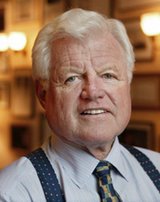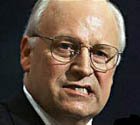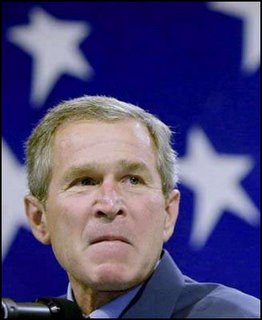
November 10, 2005
KENNEDY STATEMENT ON THE ADMINISTRATION'S EFFORTS TO EXAGGERATE THREATS IN THEIR MARCH TO WAR AS CHALABI, THE PENTAGON'S FAVORITE IRAQI DISSIDENT, VISITS D.C., KENNEDY REMINDS SENATE OF CHALABI'S OWN WORDSEarlier this week, several of our Republican colleagues came to the Senate floor and attempted to blame individual Democratic Senators for their errors in judgment about the war in Iraq.
It was little more than a devious attempt to obscure the facts and take the focus off the real reason we went to war in Iraq. 150,000 American troops are bogged down in a quagmire in Iraq because the Bush Administration misrepresented and distorted the intelligence to justify a war that America never should have fought.
As we know all too well, Iraq was not an imminent threat. It had no nuclear weapons. It had no persuasive links to Al Qaeda, no connection to the terrorist attacks of September 11th, and no stockpiles of weapons of mass destruction.
But the President wrongly and repeatedly insisted that it was too dangerous to ignore the weapons of mass destruction in the hands of Saddam Hussein, and his ties to Al Qaeda.
In his march to war, President Bush exaggerated the threat to the American people. It was not subtle. It was not nuanced. It was pure, unadulterated fear-mongering, based on a devious strategy to convince the American people that Saddam's ability to provide nuclear weapons to Al Qaeda justified immediate war.
Administration officials suggested the threat from Iraq was imminent, and went to great lengths to convince the American people that it was.
At a roundtable discussion with European journalists last month, Secretary Rumsfeld deviously insisted: "I never said imminent threat."
In fact, Secretary Rumsfeld told the House Armed Services Committee on September 18, 2002, "Some have argued that the nuclear threat from Iraq is not imminent -- that Saddam is at least 5-7 years away from having nuclear weapons. I would not be so certain."
In May 2003, White House spokesman Ari Fleischer was asked whether we went to war "because we said WMD were a direct and imminent threat to the United States." Fleischer responded, "Absolutely."
What else could National Security Adviser Condoleezza Rice have been suggesting, other than an imminent threat -- an extremely imminent threat -- when she said on September 8, 2002, "We don't want the smoking gun to be a mushroom cloud."
President Bush himself may not have used the word "imminent", but he carefully chose strong and loaded words about the nature of the threat -- words that the intelligence community never used -- to persuade and prepare the nation to go to war against Iraq.
In the Rose Garden on October 2, 2002, as Congress was preparing to vote on authorizing the war, the President said the Iraqi regime "is a threat of unique urgency."
In a speech in Cincinnati on October 7, President Bush Specifically invoked the danger of nuclear devastation: "Facing clear evidence of peril, we cannot wait for the final proof -- the smoking gun -- that could come in the form of a mushroom cloud."
At an appearance in New Mexico on October 28, 2002, after Congress had voted to authorize war, and a week before the election, President Bush said Iraq is a "real and dangerous threat."
At a NATO summit on November 20, 2002, President Bush said Iraq posed a "unique and urgent threat."
In Fort Hood, Texas on January 3, 2003, President Bush called the Iraqi regime a "grave threat."
Nuclear weapons. Mushroom cloud. Unique and urgent threat. Real and dangerous threat.
Grave threat. These words were the Administration's rallying cry for war. But they were not the words of the intelligence community, which never suggested that the threat from Saddam was imminent, or immediate, or urgent.
It was Vice President Cheney who first laid out the trumped up argument for war with Iraq to an unsuspecting public. In a speech on August 26, 2002, to the Veterans of Foreign Wars, he asserted: "We now know that Saddam has resumed his efforts to acquire nuclear weapons. Many of us are convinced that Saddam will acquire nuclear weapons fairly soon." As we now know, the intelligence community was far from certain. Yet the Vice President had been convinced.
On September 8, 2002, he was even more emphatic about Saddam. He said, "[We] do know, with absolute certainty, that he is using his procurement system to acquire the equipment he needs in order to enrich uranium to build a nuclear weapon." The intelligence community was deeply divided about the aluminum tubes, but Vice President Cheney was absolutely certain.
One month later, on the eve of the watershed vote by Congress to authorize the war, President Bush said it even more vividly. He said, "Iraq has attempted to purchase high-strength aluminum tubes which are used to enrich uranium for nuclear weapons. If the Iraqi regime is able to produce, buy, or steal an amount of highly enriched uranium a little larger than a single softball, it could have a nuclear weapon in less than a year. And if we allow that to happen, a terrible line would be crossed. Saddam Hussein would be in a position to pass nuclear technology to terrorists."
In fact, as we now know, the intelligence community was far from convinced of any such threat.
The Administration attempted to conceal that fact by classifying the information and the dissents within the intelligence community until after the war, even while making dramatic and excessive public statements about the immediacy of the danger.
In October 2002, the intelligence agencies jointly issued a National Intelligence Estimate stating that "most agencies" believed that Iraq had restarted its nuclear program after inspectors left in 1998, and that, if left unchecked, Iraq "probably will have a nuclear weapon during this decade."
The State Department's intelligence bureau, however, said the "available evidence" was inadequate to support that judgment. It refused to predict when "Iraq could acquire a nuclear device or weapon."
About the claims of purchases of nuclear material from Africa, the State Department's intelligence bureau said that claims of Iraq seeking to purchase nuclear material from Africa were "highly dubious." The CIA sent two memorandums to the White House stressing strong doubts about those claims.
But the following January, in 2003, the President included the claims about Africa in his State of the Union Address, and conspicuously cited the British government as the source of that intelligence.
Information about nuclear weapons was not the only intelligence distorted by the Administration. On the question of whether Iraq was pursuing a chemical weapons program, the Defense Intelligence Agency concluded in September 2002 that "there is no reliable information on whether Iraq is producing and stockpiling chemical weapons, or whether Iraq has -- or will -- establish its chemical warfare agent production facilities."
That same month, however, Secretary Rumsfeld told the Senate Armed Services Committee that Saddam has chemical weapons stockpiles.
He said, "We do know that the Iraqi regime has chemical and biological weapons of mass destruction," that Saddam "has amassed large clandestine stocks of chemical weapons." He said that "he has stockpiles of chemical and biological weapons," and that Iraq has "active chemical, biological and nuclear programs." He was wrong on all counts.
Yet the October 2002 National Intelligence Estimate actually quantified the size of the stockpiles, stating that "although we have little specific information on Iraq's CW stockpile, Saddam probably has stocked at least 100 metric tons and possibly as much as 500 metric tons of CW agents -- much of it added in the last year." In his address to the United Nations on February 5, 2003, Secretary of State Colin Powell went further, calling the 100 to 500 metric ton stockpile a "conservative estimate."
Secretary Rumsfeld made an even more explicit assertion in his interview on "This Week with George Stephanopoulos" on March 30, 2003. When asked about Iraqi weapons of mass destruction, he said, "We know where they are. They're in the area around Tikrit and Baghdad and east, west, south and north somewhat."
The Administration's case for war based on the linkage between Saddam Hussein and Al Qaeda was just as misguided.
Significantly here as well, the Intelligence Estimate did not find a cooperative relationship between Saddam and Al Qaeda. On the contrary, it stated only that such a relationship might develop in the future if Saddam was "sufficiently desperate" -- in other words, if America went to war. But the estimate placed "low confidence" that, even in desperation, Saddam would give weapons of mass destruction to Al Qaeda.
A year before the war began, senior Al Qaeda leaders themselves had rejected a link with Saddam. The New York Times reported last June that a top Al Qaeda planner and recruiter captured in March 2002 told his questioners last year that "the idea of working with Mr. Hussein's government had been discussed among Al Qaeda leaders, but Osama bin Laden had rejected such proposals." According to the Times, an Al Qaeda chief of operations had also told interrogators that it did not work with Saddam.
Mel Goodman, a CIA analyst for 20 years, put it bluntly: "Saddam Hussein and bin Laden were enemies. Bin Laden considered and said that Saddam was the socialist infidel. These were very different kinds of individuals competing for power in their own way and Saddam Hussein made very sure that Al Qaeda couldn't function in Iraq."
In February 2003, investigators at the FBI told the New York Times they were baffled by the Administration's insistence on a solid link between Al Qaeda and Iraq. One investigator said: "We've been looking at this hard for more than a year and you know what, we just don't think it's there."
But President Bush was not deterred. He was relentless in playing to America's fears after the devastating tragedy of 9/11. He drew a clear link -- and drew it repeatedly -- between Al Qaeda and Saddam.
On September 25, 2002, at the White House, President Bush flatly declared: "You can't distinguish between Al Qaeda and Saddam when you talk about the war on terror."
In his State of the Union Address in January 2003, President Bush said, "Evidence from intelligence sources, secret communications, and statements by people now in custody reveal that Saddam Hussein aids and protects terrorists, including members of Al Qaeda," and that he could provide "lethal viruses" to a "shadowy terrorist network."
Two weeks later, in his Saturday radio address to the nation, a month before the war began, President Bush described the ties in detail, saying, "Saddam Hussein has longstanding, direct and continuing ties to terrorist networks."
He said: "Senior members of Iraqi intelligence and Al Qaeda have met at least eight times since the early 1990s. Iraq has sent bomb-making and document-forgery experts to work with Al Qaeda. Iraq has also provided Al Qaeda with chemical and biological weapons training. An Al Qaeda operative was sent to Iraq several times in the late 1990s for help in acquiring poisons and gases. We also know that Iraq is harboring a terrorist network headed by a senior Al Qaeda terrorist planner. This network runs a poison and explosive training camp in northeast Iraq, and many of its leaders are known to be in Baghdad."
Who gave the President this information? The NIE? Scooter Libby? Chalabi?
In fact, there was no operational link and no clear and persuasive pattern of ties between the Iraqi government and Al Qaeda. A 9/11 Commission Staff Statement in June of 2004, put it plainly: "Two senior bin Laden associates have adamantly denied that any ties existed between Al Qaeda and Iraq. We have no credible evidence that Iraq and Al Qaeda cooperated on attacks against the United States." The 9/11 Commission Report stated clearly that there was no "operational" connection between Saddam and Al Qaeda. That fact should have been abundantly clear to the President. Iraq and Al Qaeda had diametrically opposing views of the world.
The Pentagon's favorite Iraqi dissident, Ahmed Chalabi, is actually proud of what happened. "We are heroes in error," Chalabi said in February 2004. "As far as we're concerned, we've been entirely successful. That tyrant Saddam is gone and the Americans are in Baghdad. What was said before is not important. The Bush Administration is looking for a scapegoat. We're ready to fall on our swords, if he wants."
What was said before does matter. The President's words matter. The Vice President's words matter. So do those of the Secretary of State, the Secretary of Defense and other high officials in the Administration. And they did not square with the facts.
The Intelligence Committee agreed to investigate the clear discrepancies, and it's important that they get to the bottom of this, and find out how and why President Bush took America to war in Iraq. Americans are dying. Already more than 2000 have been killed, and more than 15,000 have been wounded.
The American people deserve the truth. It's time for the President to stop passing the buck and for him to be held accountable.
 Gosh, I hope I can find enough pictures of sharks in a feeding frenzy. I'll continue to look for more cuz it looks like I'm gonna need them. [smile]
Gosh, I hope I can find enough pictures of sharks in a feeding frenzy. I'll continue to look for more cuz it looks like I'm gonna need them. [smile]

 What does the bird flu have to do with Viagra?
What does the bird flu have to do with Viagra?








